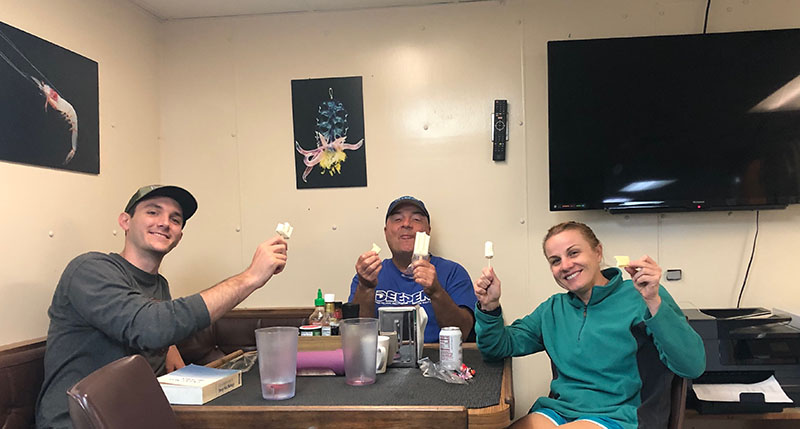
By Sönke Johnsen, Professor of Biology - Duke University
June 9, 2019
As they say, "love nature, but always remember that it doesn't love you back." Nature is nature, and not interested in our love – or our plans. In this case, it is not interested that we have been planning for this cruise for two years, and that I – as chief scientist – have sent well over 100 emails over the past two months to the science party, the ship's crew, and various people in charge of money, insurance, and forms, all to ensure that we would be sending the remotely operated vehicle (ROV) down to the bottom of the ocean yesterday morning at 11 am. Instead, we have been pinned in by foul weather for almost two days, first by rough seas and now rain.
Rain at sea is not like rain on land. If you live near the East Coast, you may have noticed that the front you see on RADAR and that ruined your picnic plans often balloons into a much bigger and uglier thing once it reaches the Atlantic. The moisture of the air over the ocean, and the heat of the water itself, fuels rain and wind to an intensity that you seldom see on land. In this case, the winds rose only to gusts of about 45 mph, but the rain shot by in a sideways blast that lasted hours on and off and quickly filled the five-gallon buckets that were left on the back deck.

L-R, Alexander Davis; Tracey Sutton, Ph.D.; and Heather Bracken-Grissom, Ph.D. enjoying coconut ice cream bars and discussions with colleagues while waiting on the rain to pass! Image courtesy of Journey into Midnight: Light and Life Below the Twilight Zone. Download larger version (jpg, 2.0 MB).
So we're here, some of us talking to each other, some reading books on fish, some working on their computers in the mess (dining room), and some are laid low by the weather and resting in their bunks. I myself tried to take a shower, which – since my room is near the bow and one floor up – meant standing in a metal box that was moving about like a carnival ride, with me hanging on to a purpose-built rail with one hand and trying to get clean with the other while not being tossed into the toilet.
At the moment, we have a short respite from the rain and are trying to steam a bit north to get away from it. If this works, we will try to get the Medusa camera into the water.
Weather is always a factor in ocean work, and no two-week cruise ever has 14 straight days during which we can actually work. While this can be frustrating, given the time and money involved, it does serve to remind us who is really in charge of this planet. We often feel important, enveloped by our machinery, protected by our structures, and lost in our plans and dreams, but we all live at the sufferance of a power so much greater than our own.
I find this comforting. Maybe because I don't like being in charge, maybe because I believe nature is grand and beautiful on a scale that deserves our awe, respect, and devotion. Mostly though, I feel that nature deserves to be in charge. It was here first, and will likely be here long after we are gone. It also, when left alone, seems to know what it's doing. So let it rain.